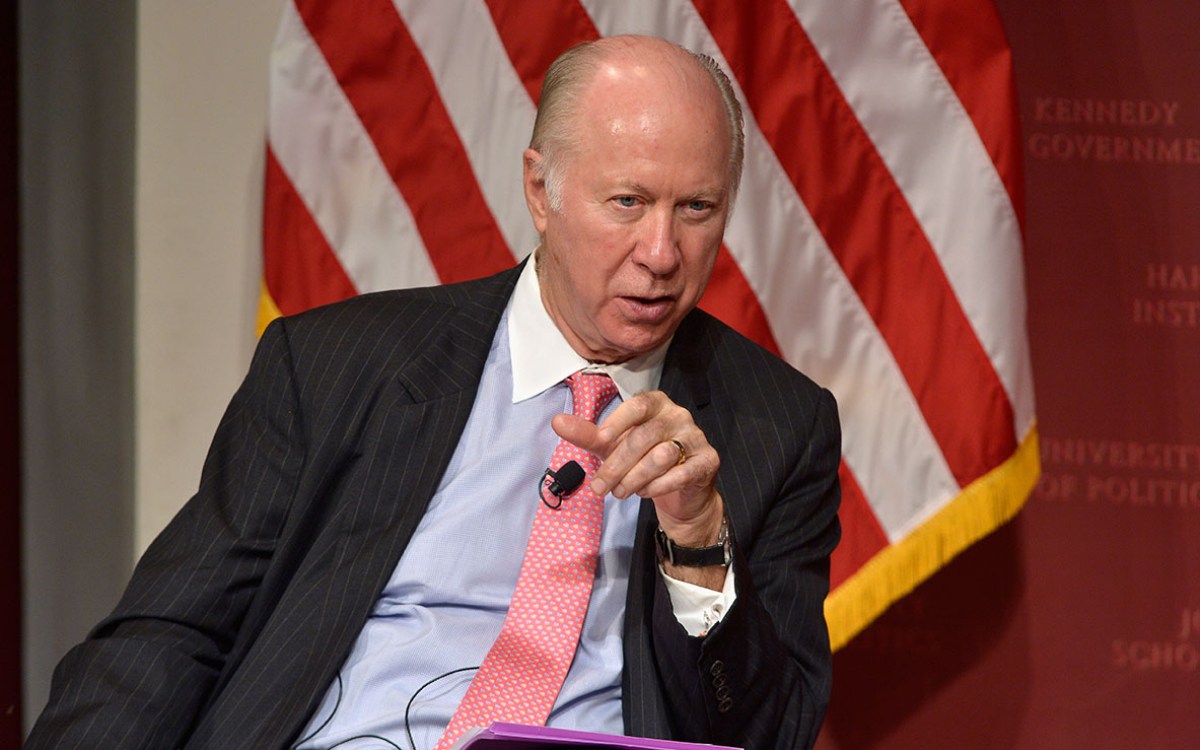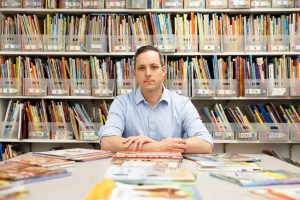
Ronald Heifetz, a senior lecturer at the Harvard Kennedy School, outlined some of the difficulties of using the case study method to teach students who come from across the globe, bringing with them various experiences and values. “You can’t assume the same standards apply,” Heifetz said.
Photos by Stephanie Mitchell/Harvard Staff Photographer
Helping teachers hone their techniques
Seminar an education in classroom dynamics
The two-dozen professors who made their way to Lamont Library last week weren’t in search of the kind of expertise found in books. Instead, they gathered in the Forum Room to see what they could learn from one of their own.
There, Ronald Heifetz, a senior lecturer at the Harvard Kennedy School, outlined some of the difficulties of using the case study method to teach students who come from across the globe, bringing with them various experiences and values.
“You can’t assume the same standards apply,” Heifetz said.
The solution? Have students generate cases based on their own experiences.
“The challenge is that you don’t know what students will throw at you,” he said. “You have to be willing to learn and flounder in public.”

The seminar was the last in this year’s “Talking about Teaching” series, a University-wide effort to explore pedagogical connections across disciplines and Schools. Run by the Office of Faculty Development and Diversity, and underwritten by the Harvard Initiative for Learning and Teaching (HILT), the series attracted a range of faculty members seeking new models and techniques to improve classroom teaching.
“We have humanists, social scientists, and scientists,” said Judith D. Singer, senior vice provost for faculty development and diversity. “One of the most fun parts is the opportunity to be a student again. There are too few opportunities for faculty to experience what it’s like to be a student in class.”
For the faculty at Heifetz’s seminar, the experience was a bit unsettling. After lecturing for 30 minutes, Heifetz asked, “What’s the nature of authority?” and took a seat with the rest of the group. Silence ensued as seasoned and junior faculty glanced uncomfortably around the room.
“What should we do?” Harvard Law School Professor Lani Guinier asked.
More silence. After a very long two minutes, the conversation began to trickle.
Rose Goldman, an associate professor at the Harvard School of Public Health, shared an anecdote about a similar experience in medical school. Samuel Moulton, HILT’s director of educational research and assessment, pondered the notion of authority in the classroom. And Harvard Law School Professor Wendy Jacobs wondered whether students learn better when they are in, or out, of their comfort zones.
At the end of the two-hour session, the attendees agreed they had a better understanding of the dynamics of the classroom.
“I’m hearing that perspectives are diverse when different people hear the same thing,” Goldman said.
While last year’s sessions focused on using the case study in the classroom, this year’s focused on experiential learning, showcasing the work of “master teachers” through demonstrations of their pedagogy and discussions of its usefulness in other disciplines and Schools.
With the University divided into Schools and departments, several attendees say the seminars have provided a welcome opportunity to learn from peers.
“It’s been very exciting,” said Rob Lue, professor of the practice of molecular and cellular biology. “As different as all of the Schools are, there’s much we can learn from one another.”
In addition to Heifetz, leaders of this year’s sessions were Harvard Business School Professor Joshua Margolis, Graduate School of Education Professor Eleanor Duckworth, and Graduate School of Design Professor Michael Hays. Each session stressed a different teaching method — from working in small groups to guiding class discussions to using lectures more effectively.
“So often in my field, things are very clean-cut,” said Hanspeter Pfister, professor in computer science. “Unfortunately, that makes class discussion less engaging. In going to these sessions, I realized that I need to do a better job of digging deeper. I tend to want to jump to answers quickly and give students an explanation. But it would probably be more engaging to let the students come up with the answers.”
After attending a few sessions, faculty members say they’ve begun to apply the techniques in their classrooms.
“The open-ended exploration is a great way to get students in larger classes thinking and deeply engaged,” Lue said.
HBS Professor Rohit Deshpande said he recently used a role-playing method he learned in one of the seminars in a case-writing workshop he was facilitating for a group of professors in Mumbai.
“We began with the professors role-playing students for a business ethics case discussion, then switched to the more traditional role of instructor to deconstruct the teaching plan,” he said. “Worked beautifully.”
Singer said that she plans to launch another Talking about Teaching series in the fall.




